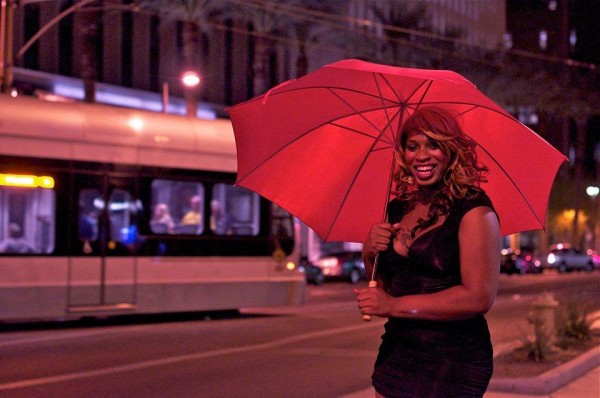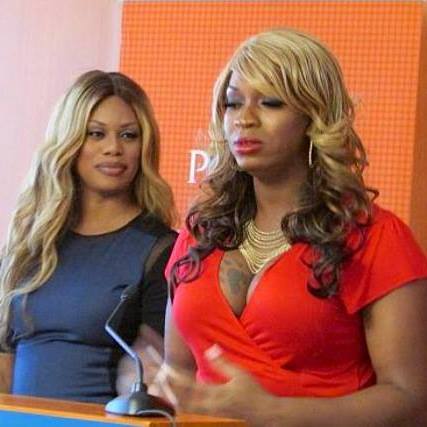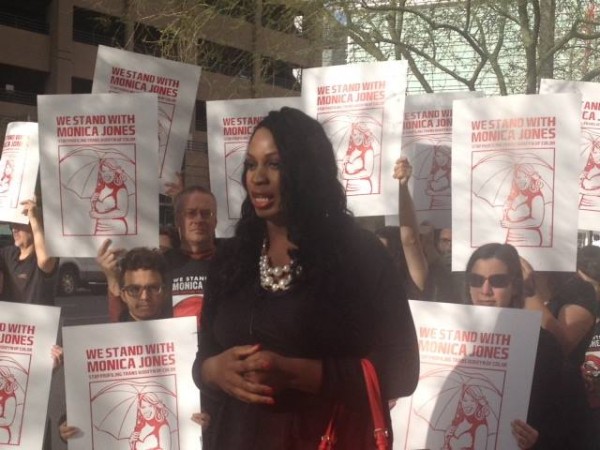
In May 2013, sex worker and trans rights activist and Arizona State University social work student Monica Jones was charged with “manifestation of prostitution” in Phoenix after accepting a ride from an undercover cop. Her arrest ignited a firestorm of protest against Project ROSE, a prostitution arrest diversion program run by the ASU School of Social Work and the Phoenix police that utilized arrest sweeps; transphobia in those prostitution arrests; and the potentially unconstitutional “manifestation of prostitution” statute under which she was prosecuted. The ACLU, SWOP-Phoenix, and other sex work and GLBT activists stood in solidarity with Jones as she gained international attention speaking out against her charges.
“The reason why this law [the manifestation of prostitution statute] is so unjust is because it gives the police the credibility to say who’s a sex worker, who’s not a sex worker…it violates our [our First Amendment rights]—just to walk down the street, our freedom of speech,” Jones explained to us. Since her arrest, Jones has gained prominence as an eminent activist, been interviewed by dozens of media outlets, met Laverne Cox, and traveled to Australia for public speaking engagements and study, all while working towards finishing her social work degree.
In November, Jones told Best Practices Policy Project that Project ROSE had been shut down, a crucial victory for the movement in Arizona. And though Jones was initially convicted, her January 2014 appeal was successful and the conviction was vacated. We spoke with her just before the announcement was made; below is a condensed and edited version of our interview, originally conducted via video chat.
Recently, your conviction was vacated. What does that mean for you? What’s next?
I got a call from the court yesterday evening saying that the prosecutors are not going to retry me. So right now we’re looking to see if it’s with prejudice or without prejudice and will it still have an effect on me challenging the constitutionality of the law.
So your ultimate goal with your legal team is to use the case to overturn the law altogether. How can people from other states help fight the law; help fight your campaign against it?
I think there’s a lot more laws like this across this country—like “loitering with intent of prostitution,” and condoms as evidence. I think that they need to take on their own fights in their own homes and their own cities. Because when we get rid of these laws it basically gets rid of sexism and discrimination and transphobia. And it takes the power away from the cops and the justice system to say who is sex working and who’s not sex working.
A story that brought you to the news in the last few months was your deportation from Australia at the Sydney Airport. From what I read, during your encounter with immigration you were pressured by the producers of the reality show Border Security to have your case filmed. When you refused after initially agreeing, after you realized they planned to sensationalize your story, customs officials began to treat you much more harshly. Can you tell us more about what happened there?
So what happened was I was legally constrained to come back to my appeals. I was doing my internship in Australia, with Scarlet Alliance, a great sex worker organization there, and I was leaving there to come back for my case and I was traveling back to Australia in three days. So when I got to the airport to leave to come to the U.S., they went through all my stuff. They went through my purse, they went through my phone, they went through my suitcase, they went through everything. I had everything about my court case in there in the folder. They went in a back room and went through that. They said, “Okay, you’re good to go.” So I was thinking, okay, I’m good to go.
And when I came back from the U.S., they had pulled me to the side and took me into this room, where I was proceeded to be asked, “Do you want to be filmed by this camera crew?” And the producer of the show said, “We think that your story is interesting.” Which, I’d never told them anything about my story—they know nothing about my story! And so I’m thinking, how do they know my story is interesting? So they kept on asking me questions.
After being pressured I agreed to be filmed. But during the middle of it, I said, “I don’t feel right with this, I think this is suspicious.” And once I did that they were very harsh against me—”Oh, you were doing this, you violated your visa…”
If I violated my visa, you guys should have let me know when you guys originally checked me on my way out of the country! The judge later asked [the immigration officials],” Why were you checking her on her way out of the country?” So they said I was a threat to national security. So I guess activism is a threat to Australia’s security.

What can you tell us about your legal team’s plan to subpoena the Seven Network, the channel that runs that reality show, Border Security, that mobbed you right at the immigration office?
The funny thing is, what I obtained, the documents, everything’s redacted, everything’s erased or whited over. So there’s nothing really there. Everything that would incriminate them, they took out. And we know the government can do that! So basically, I don’t know. I’m just hoping that, once I get my day in court, the judge will understand.
Do you think there’s some sort of “you pat my back, I’ll pat yours” sort of arrangement going on between Australian immigration officials and this reality TV show, since they knew to meet you right there, and they knew all about your “story,” enough to say that it was interesting? That’s absurd.
I think there is. When the government is working with a TV show…that’s never a good indication.
And when they’re drumming up publicity for border security and immigration…it’s gonna drum up this whole big ole publicity. So what’s more publicity than an African American trans woman coming in? So I think that was part of their deal with me: “This person is interesting, we know she’s coming back, we can do this whole thing and send her back to the U.S.”
But they fucked with the wrong person and I was not going to take it lying down.
You’ve spent all year being interviewed by one media outlet after another. And your objection to having your story filmed by this reality show was that you knew that they were going to sensationalize you. What have you learned about the sort of tricks the media uses to sensationalize trans women’s stories? What can you tell other trans women interviewees about how to protect themselves in those situations?
I think with the media it’s very dicey. The only reason that they try to get me on the interview is because something bad happened or it’s something like their Flavor of the Month. I like to think about Janet Mock’s interviews with Katie Couric and with Piers Morgan where they used trans issues as sensationalization: “Oh, have you had your surgery?” “ You were born a boy?” “When did you know you were a woman?”
Just say “That’s none of your business,” or say, “That’s besides the point—that’s very personal, and you don’t have no right to it. What the issue is…” Just go on and talk about the issues, like, “The issue is understanding the boundaries of trans women, respecting trans women.” So, redirecting the question in a positive way, and I think that that’s the best way to do it, and I think that it’s a way that we can use their curiosity about us to get our issues out there, like the countless trans women of color being murdered at the beginning of the year.

Right, so the way Janet Mock confronted Piers Morgan, because he wasn’t asking questions about her book, he was asking invasive questions about her body, and the way that you navigated many other interviews to bring the issue back around to sex workers’ rights and trans women’s rights, rather than allowing them to, as you say, make you a Flavor of the Month and question your gender. You yourself have experienced a lot of transphobia throughout your case. The Advocate dubbed your police encounters after your initial arrest for manifestation as being stopped for “walking while trans.” In the year or so since you were falsely arrested, as you mentioned, many Black trans women have been killed, most recently Lamia Beard, Ty Underwood, and Ms. Edwards. Many of these women were misgendered by the media reporting on their murders. What can the sex workers’ rights movement do to help Black trans women fight for their rights and safety?
I think just being an ally and bringing up these issues, addressing these issues: Why trans women get into sex work. Just basically saying, these are lives here. Constantly just sharing our stories, like Tits and Sass, like you guys—start writing our stories, start writing about these issues, about this epidemic of trans women of color getting murdered. If we allow a way for trans women of color to get their voices out there, I think that’ll help.
Right, just allowing a platform for trans women to speak because so often they’re spoken over and ignored, that sounds like it could be a great start.
So the other good news you got recently was the discontinuation of Project ROSE in November. What can we learn as activists from the defeat of Project ROSE? What did you and SWOP-Phoenix do right there—and the ACLU and all the other organizations that were involved in campaigning against Project ROSE—and how can we repeat that success elsewhere?
I think the biggest thing that we can do is what we just did right now in my case—it started off little, it started off with Tits and Sass, it started off with Best Practices Policy. Just keep on telling the story and [talking about] how flawed this program is. From that it became national news!
We have to start small and work our way up and not give up, and just keep on going. Because we know these programs are flawed, and we know they do not work. Just basically going out there and protesting and drawing national attention to it. Even though the news crews were there just to see the program—to see, oh, how great a program this is—then you have protesters out there and you know they’re from SWOP-Phoenix and other organizations and you say well, ok, there’s a clear line here. I think, letting sex workers speak for themselves and letting our voices be heard would be the best way to combat these diversion programs, programs like Project ROSE.
You’re still in the midst of finishing your social work degree.
Yes…God! [Chuckles]

I can’t imagine how you kept up with your school work, actually, with all this going on in the background.
In your statement about Project ROSE shutting down, you said that “[u]sing coercive tactics such as those central to Project Rose contradicts everything social work stands for. Social workers are supposed to defend social justice and free will.”
When you finish social work school, how do you plan to work towards those ideals of social justice and free will as a social worker? What can social workers do to help trans women and sex workers?
I’m going to contain my advocacy work around sex work and trans issues. Social work allowed me the education and the degree to back me up. Because as my friend in Australia said, “What’s more dangerous than an African American trans woman? An African American trans woman with an education.” I can talk about trans issues and sex workers’ issues, and not have a degree, and it sounds great, but with a degree there’s validity behind it.
With social workers, you have to listen to your client, and address the issue your client needs. If your client is coming in just for resources to [access] condoms and healthcare, help them on that. Don’t sit there and say, “Because you’re a sex worker, because you’re trans, these are the issues.” No! The issue is the fucked up system that we live inside, the fucked up social system, the welfare system, the government. As social workers, we bridge the gap between the system and the communities that we serve. Just being more culturally grounded, in understanding the community you’re trying to serve, makes you a more effective social worker and makes your clients able to receive your services.
Unlike Project ROSE, which implicitly blamed the individual—”there’s something wrong with this person because they turned to sex work”—you’re bringing it back to the system that gives people few economic choices. You’re saying, just like the harm reduction movement: Meet the client where they’re at, meet people where they’re at, and see what people need instead of imposing what you think they need on them.
You’ve had so many opportunities to speak to audiences all over the world through the media coverage on your case this year, but what would you say to an audience of mostly sex workers, like ours? What do you feel like you’ve learned from your case that you can tell us?
Never take it lying down, never take the arrest lying down—keep on fighting. What you’re doing, there’s nothing wrong with it. The only thing that’s wrong is the fucked up laws that are policing individuals’ bodies. I think that you’re brave; I think that you’re strong. I think the issue is not sex workers, I think it’s the world and the individuals that say sex work is wrong.
[…] and to the following interview with Black trans sex work activist Monica Jones, who just beat her case and helped get Project Rose, the terrible, punitive, “sex work conversion” project in Arizona, shut down! https://titsandsass.com/nothing-scarier-than-a-black-trans-woman-with-a-degree-an-interview-with-moni… […]
[…] 2013, Monica Jones, a black transgender woman, was arrested for prostitution while accepting a ride home. She was […]
[…] to): Strippers entrapped in screwball raids, massage workers surveilled thanks to the Patriot Act, trans women profiled and unlawfully arrested and law enforcement themselves acting as traffickers. It’s such a simple concept: Criminalization […]